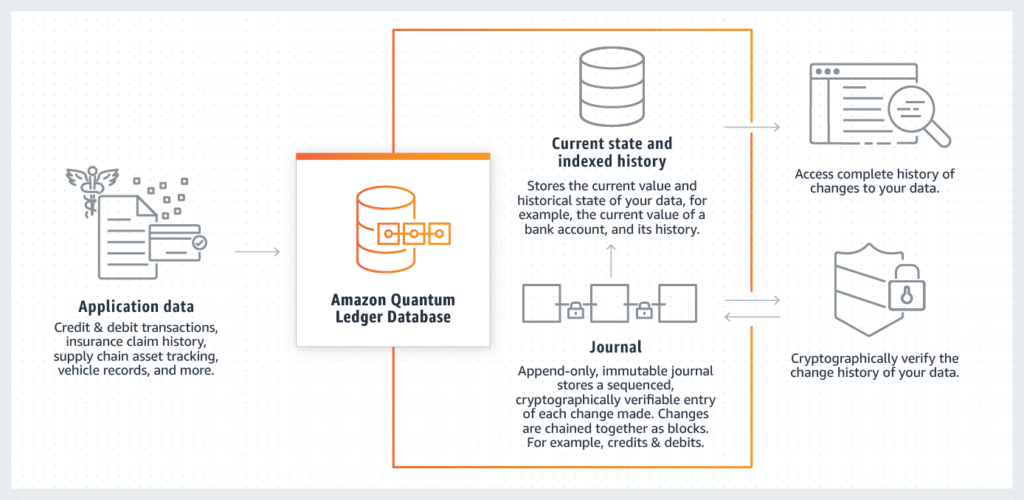Blockchain technology has rapidly evolved from a mere underpinning of cryptocurrencies to a pivotal force driving innovation across various industries. Amazon Web Services (AWS) has embraced this evolution with its dedicated blockchain services, specifically designed to integrate seamlessly into existing business infrastructures. This article explores how AWS Blockchain is setting new standards in various sectors by providing robust and scalable solutions.
Table of Contents
Overview of AWS Blockchain
AWS Blockchain services consist of two primary offerings: Amazon Quantum Ledger Database (QLDB) and Amazon Managed Blockchain.
Amazon Quantum Ledger Database (QLDB)
Amazon QLDB is a fully managed ledger database designed to provide a transparent, immutable, and cryptographically verifiable transaction log, which is maintained by a central trusted authority. This service simplifies the process of tracking application data changes in a sequenced, transparent journal. Its built-in cryptographic features ensure the integrity of data, making it ideal for applications that require a complete and verifiable history of data changes. QLDB is highly scalable with a serverless design, making it cost-effective as you pay only for what you use. It supports various use cases, such as financial transactions, supply chain management, and centralized digital records.
Key Features:
- Immutable and transparent append-only journal.
- Cryptographic verification for data integrity.
- Serverless architecture with automatic scaling.
- Supports PartiQL for SQL-like data access.

Amazon Managed Blockchain (AMB)
Amazon Managed Blockchain is a service that enables you to build and manage scalable blockchain networks, facilitating easy integration without the need for specialized infrastructure. It supports multiple popular blockchain frameworks like Ethereum and Hyperledger Fabric, allowing for the deployment of decentralized applications that require robust, scalable performance. AMB eliminates the complexities of infrastructure setup, enabling developers to focus on innovation and application development with the help of reliable blockchain APIs.
Key Features:
- Fully managed blockchain service for building Web3 applications.
- Supports Ethereum, Polygon, Bitcoin, and Hyperledger Fabric.
- Serverless access to multiple blockchains for easy data retrieval.
- Developer-friendly APIs for real-time and historical data integration.
Benefits of AWS Blockchain
The integration of AWS Blockchain brings numerous benefits, including enhanced security, scalability, and reduced need for a central oversight authority. By automating trust and authentication, businesses can streamline operations, reduce fraud, and enhance customer experiences. Additionally, AWS Blockchain’s ability to scale on demand allows businesses to manage large volumes of transactions without compromising performance.
Industry Applications of AWS Blockchain
Finance
In finance, AWS Blockchain can revolutionize how transactions are processed by reducing the need for intermediaries and lowering transaction costs. This capability is particularly beneficial in areas like real-time payments, asset management, and compliance automation.
Supply Chain Management
AWS Blockchain provides unprecedented transparency and efficiency in supply chains. By recording every transaction in an immutable ledger, all parties can trace the origin, production, and distribution of products, significantly reducing the potential for fraud and errors.
Healthcare
The healthcare industry benefits from AWS Blockchain through the secure and efficient management of patient records. Allowing data to be shared securely among authorized parties ensures privacy and improves the accuracy of medical records, which is crucial for effective patient care.
Retail
For retail, AWS Blockchain can help verify the authenticity of products and manage supply chains more effectively. This is especially useful in combating counterfeiting and ensuring consumers receive genuine products.
Challenges and Considerations
While AWS Blockchain offers significant advantages, organizations must consider challenges such as the initial complexity of blockchain integration and the cost of implementation. Businesses need to assess whether the benefits of blockchain technology align with their operational goals and whether they have the necessary technical expertise to implement it.
Comparing AWS Blockchain to Other Blockchain Services
When compared to other blockchain platforms like IBM Blockchain or Microsoft Azure Blockchain, AWS Blockchain stands out for its deep integration with other AWS services and its robust global infrastructure. This integration allows for easier and more flexible implementations of blockchain solutions within existing AWS environments.
Future of AWS Blockchain
The future of AWS Blockchain looks promising with continuous advancements in blockchain technology. AWS continues to expand its services, recently adding support for Ethereum and Hyperledger Fabric, making it easier for businesses to join public networks or create private networks. As blockchain technology evolves, AWS is expected to introduce more features that will further simplify the adoption and implementation of blockchain across more industries.
Conclusion
AWS Blockchain is revolutionizing industry standards by providing powerful, scalable, and secure blockchain solutions that integrate seamlessly with existing business infrastructures. As industries continue to recognize the potential of blockchain technology, AWS Blockchain is well-positioned to lead this transformative journey, helping businesses innovate and achieve new efficiencies.




